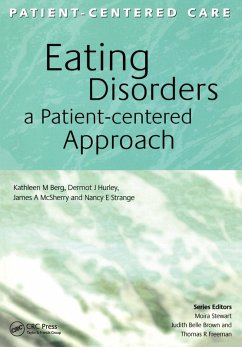
The Prevention of Eating Problems and Eating Disorders (eBook, ePUB)
Theories, Research, and Applications
Versandkostenfrei!
Sofort per Download lieferbar
61,95 €
inkl. MwSt.
Weitere Ausgaben:

PAYBACK Punkte
31 °P sammeln!
In a detailed analysis of the field of eating problems and disorders, this book highlights the connections between the prevention of eating problems and disorders, and theory and research in the areas of prevention and health promotion. It also looks at models of risk development and prevention, specific issues and challenges, the status of current prevention research, and lessons for prevention program development.In this unique text Levine and Smolak draw on a range of interdisciplinary perspectives, including prevention science, developmental psychology, public health, and neuroscience, to ...
In a detailed analysis of the field of eating problems and disorders, this book highlights the connections between the prevention of eating problems and disorders, and theory and research in the areas of prevention and health promotion. It also looks at models of risk development and prevention, specific issues and challenges, the status of current prevention research, and lessons for prevention program development.
In this unique text Levine and Smolak draw on a range of interdisciplinary perspectives, including prevention science, developmental psychology, public health, and neuroscience, to provide a thorough review, history, and critique of the topic in light of a range of empirical studies. The only authored volume with a broad, detailed and integrated view of theories, research, and practice, this expanded, fully revised, and updated new edition features new chapters on dissonance-based approaches, public health, biopsychiatry and neuroscience, gender, culture(s), technology, obesity, protective factors, and ecological approaches.
The Prevention of Eating Problems and Eating Disorders: Theories, Research, and Applications is essential reading for clinicians, academics, researchers, graduate students, upper-level undergraduates, and activists and advocates involved in work pertaining to eating disorders, disordered eating, prevention, health promotion, body image, obesity and biopsychosocial perspectives.
In this unique text Levine and Smolak draw on a range of interdisciplinary perspectives, including prevention science, developmental psychology, public health, and neuroscience, to provide a thorough review, history, and critique of the topic in light of a range of empirical studies. The only authored volume with a broad, detailed and integrated view of theories, research, and practice, this expanded, fully revised, and updated new edition features new chapters on dissonance-based approaches, public health, biopsychiatry and neuroscience, gender, culture(s), technology, obesity, protective factors, and ecological approaches.
The Prevention of Eating Problems and Eating Disorders: Theories, Research, and Applications is essential reading for clinicians, academics, researchers, graduate students, upper-level undergraduates, and activists and advocates involved in work pertaining to eating disorders, disordered eating, prevention, health promotion, body image, obesity and biopsychosocial perspectives.
Dieser Download kann aus rechtlichen Gründen nur mit Rechnungsadresse in A, B, BG, CY, CZ, D, DK, EW, E, FIN, F, GR, HR, H, IRL, I, LT, L, LR, M, NL, PL, P, R, S, SLO, SK ausgeliefert werden.













